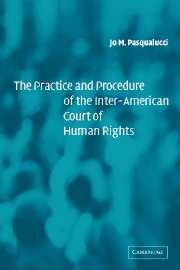Book contents
- Frontmatter
- Contents
- Foreword
- Preface
- Acknowledgments
- Table of cases
- Table of Articles of the American Convention on Human Rights
- Table of 2001 Rules of Procedure of the Inter-American Court on Human Rights
- Table of 2001 Rules of Procedure of the Inter-American Commission on Human Rights
- Table of other legal instruments and documents
- 1 Introduction
- PART I The advisory jurisdiction of the Inter-American Court
- PART II The contentious jurisdiction of the Inter-American Court of Human Rights
- PART III Provisional measures
- Appendix 1 American Convention on Human Rights
- Appendix 2 Rules of Procedure of the Inter-American Court of Human Rights
- Appendix 3 Statute of the Inter-American Court of Human Rights
- Appendix 4 Rules of Procedure of the Inter-American Commission on Human Rights
- Appendix 5 Form for presenting petitions on human rights violations
- Bibliography
- Index
Appendix 4 - Rules of Procedure of the Inter-American Commission on Human Rights
Published online by Cambridge University Press: 28 July 2009
- Frontmatter
- Contents
- Foreword
- Preface
- Acknowledgments
- Table of cases
- Table of Articles of the American Convention on Human Rights
- Table of 2001 Rules of Procedure of the Inter-American Court on Human Rights
- Table of 2001 Rules of Procedure of the Inter-American Commission on Human Rights
- Table of other legal instruments and documents
- 1 Introduction
- PART I The advisory jurisdiction of the Inter-American Court
- PART II The contentious jurisdiction of the Inter-American Court of Human Rights
- PART III Provisional measures
- Appendix 1 American Convention on Human Rights
- Appendix 2 Rules of Procedure of the Inter-American Court of Human Rights
- Appendix 3 Statute of the Inter-American Court of Human Rights
- Appendix 4 Rules of Procedure of the Inter-American Commission on Human Rights
- Appendix 5 Form for presenting petitions on human rights violations
- Bibliography
- Index
Summary
Approved by the Commission at its 109th special session held 4–8 December 2000.
TITLE 1
ORGANIZATION OF THE COMMISSION
CHAPTER I
NATURE AND COMPOSITION
Article 1
Nature and Composition
The Inter-American Commission on Human Rights is an autonomous organ of the Organization of American States whose principal functions are to promote the observance and defense of human rights and to serve as an advisory body to the Organization in this area.
The Commission represents all the Member States of the Organization.
The Commission is composed of seven members elected in their individual capacity by the General Assembly of the Organization. They shall be persons of high moral character and recognized competence in the field of human rights.
CHAPTER II
MEMBERSHIP
Article 2
Duration of the Term of Office
The members of the Commission shall be elected for four years and may be re-elected only once.
In the event that new members of the Commission have not been elected to replace those completing their term of office, the latter shall continue to serve until the new members are elected.
Article 3
Precedence
The members of the Commission shall follow the President and Vice-Presidents in order of precedence according to their seniority in office. When there are two or more members with equal seniority, precedence shall be determined according to age.
Article 4
Incompatibility
The position of member of the Inter-American Commission on Human Rights is incompatible with the exercise of activities which could affect the independence or impartiality of the member, or the dignity or prestige of the office.
The Commission, with the affirmative vote of at least five of its members, shall decide whether a situation of incompatibility exists.
[…]
- Type
- Chapter
- Information
- Publisher: Cambridge University PressPrint publication year: 2003



